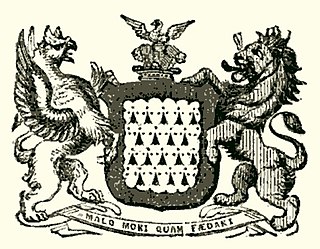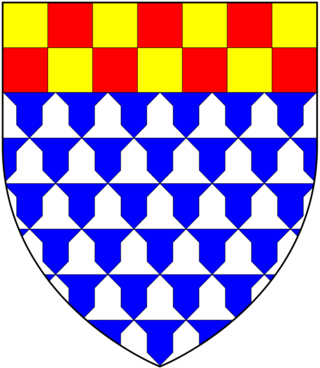| |||||
| Centuries: | |||||
|---|---|---|---|---|---|
| Decades: | |||||
| See also: | Other events of 1370 List of years in Ireland | ||||
Events in 1370 in Ireland.
| |||||
| Centuries: | |||||
|---|---|---|---|---|---|
| Decades: | |||||
| See also: | Other events of 1370 List of years in Ireland | ||||
Events in 1370 in Ireland.
Simon Fleming becomes the first Baron Slane whose holding of the title can be conclusively established. [2]
Christopher Bernevall, Irish judge and politician [3] (died in 1446) [4]

Earl of Longford is a title that has been created twice in the Peerage of Ireland.

Baron Trimlestown, of Trimlestown in County Meath, was a title in the Peerage of Ireland. Following the death of the 21st Baron in January 2024 with no known heir, the title is dormant, and may be extinct.

Slane Castle is located in the village of Slane, within the Boyne Valley of County Meath, Ireland. The castle has been the family seat of the Conyngham family since it was built in the late 18th century, on land first purchased in 1703 by Brig.-Gen. Henry Conyngham.

Gerard FitzGerald, 9th Earl of Kildare, was a leading figure in 16th-century Irish History. In 1513 he inherited the title of Earl of Kildare and position of Lord Deputy of Ireland from his father.

Baron Slane was a title in the Peerage of Ireland. It was created in 1370 for the Fleming family but forfeited in 1691.
Thomas Fleming (1593–1665) was an Irish Franciscan and Roman Catholic Archbishop of Dublin; he was entitled to hold the title Baron Slane, but renounced it.

Simon Fleming is the first Baron Slane whose holding of the title can be conclusively established.
Thomas Fleming (1358-1435), 2nd Baron Slane, was a member of the Parliament of Ireland from 1394-1395, and again from 1401-12. He is mainly remembered for kidnapping the senior judge Richard Rede, from whom he extorted a large ransom. He managed to escape punishment for the crime.
James Fleming was an Irish nobleman, who sat as a member of the House of Lords in the Irish Parliament in 1491 and also served as High Sheriff of Meath.
Christopher Fleming was an Irish nobleman, who was Lord High Treasurer of Ireland from 1514 until his death. He succeeded as 8th Baron Slane in 1492.
Thomas Fleming was an Irish peer, and a member of the Parliament of Ireland of 1585. He was the son of James Fleming, and great-grandson of James Fleming, 7th Baron Slane. His mother was Ismay Dillon, daughter of Sir Bartholomew Dillon, Lord Chief Justice of Ireland and his first wife Elizabeth Barnewall; after his father's death she remarried Sir Thomas Barnewall of Trimlestown.

Christopher Fleming, 1st Viscount Longford and 17th Baron Slane (1669–1726), was an Irish peer and a member of the Irish parliament of 1689.
James Ellis Fleming was an Irish claimant to the title of 20th Baron Slane.
The High Sheriff of Meath was the British Crown's judicial representative in County Meath, Ireland, from the conquest until 1922, when the office was abolished in the new Free State and replaced by the office of Meath County Sheriff.
Christopher Bernevall, or Barnewall (1370–1446) was an Irish politician and judge of the fifteenth century, who held the offices of Vice-Treasurer of Ireland and Lord Chief Justice of Ireland. He was deeply involved in the political controversies of his time, and was a leading opponent of the powerful Anglo-Irish magnate James Butler, 4th Earl of Ormond. His elder son Nicholas also held office as Lord Chief Justice, and his younger son Robert was created the first Baron Trimleston.
Christopher Preston, 2nd Baron Gormanston was an Anglo-Irish peer and statesman. He was accused of treason and imprisoned in 1418-19, but was soon released and restored to royal favour.
Richard White was an Irish judge who held office as Lord Chief Justice of Ireland; he is remembered mainly for his complaints to the English Crown about the corruption and inefficiency of his judicial colleagues.
Richard Rede was a leading Irish statesman and judge of the late fourteenth and early fifteenth centuries. He held office as Chief Baron of the Irish Exchequer, Lord Chief Justice of Ireland, Deputy Lord Chancellor of Ireland and Deputy Treasurer of Ireland.
Barnaby Barnewall was an Irish barrister and judge, and a founder member of the military guild, the Brotherhood of Saint George.
Henry Moore, 1st Earl of Drogheda PC (I) was an Anglo-Irish peer, politician and soldier.